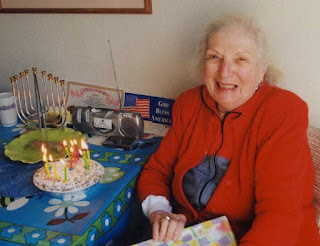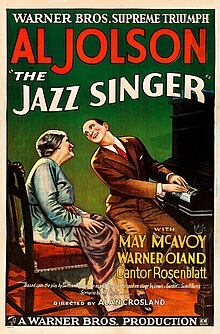 |
| Bubbie's 90th Birthday |
She loved stories, and she loved learning.
Until the end of her life, she read newspapers and listened to lectures and talk shows, always trying to learn something new.
And when she did learn something new, she used to exclaim, "How d'ya like that!"
Now to understand her story that I'm about to tell you, it would help to recall The Jazz Singer.
I'm talking about the great Al Jolson original.
 |
You may recall that the struggle is between the young Jolson who wants to sing popular music and assimilate into American culture, and his father, a umpteenth-generation orthodox cantor.
This dialectic is a snapshot of the two kinds of Jews during that period (1880-1920).
There were the religious Jews who had to struggle to hang on to their Judaism - such as keeping Shabbos in a culture that expected them to work seven days a week.
Then there were the less committed Jews who were less uncomfortable with the great melting pot.
Bubbie's world: the West Side of Chicago, 1911.
A community with all kinds of Jews.
Her parents were the latter kind of Jew. Chicago was their kind of town. They could do what they wanted, eat what they wanted, and still speak Yiddish to all their friends.
The music stopped, however, when grandma came.
I.e., Bubbie's bubbie.
Her father Alexander and her uncle Arle brought over their mother from Ukraine.
"Once my bubbie came," Bubbie reminisced, "There was no more driving on Shabbos.
"We had to walk all the way to my grandmother's apartment every Shabbos."
Try to imagine her telling that at age 90 in a listful way that made you think you were talking to the little girl who found this new rule restrictive and inconvenient.
As far as I know it was a few blocks. But in her memory, it was a trek across the Sahara.
So I asked her, "Bubbie, why did your father do that? Why did he stop driving on Shabbos?"
"I guess he was afraid to when his mother was around. I guess he respected her."
"Do you think he was doing a mitzvah?"
"I suppose he was. I never thought about it that way before. How d'ya like that."
For your table - When should a child (of any age) do something for their parent even though they don't want to?
Shabbat Shalom
PS - Want to make your Table Talk rabbi happy? Like it, tweet it, or just forward it to someone who might enjoy it.
No comments:
Post a Comment